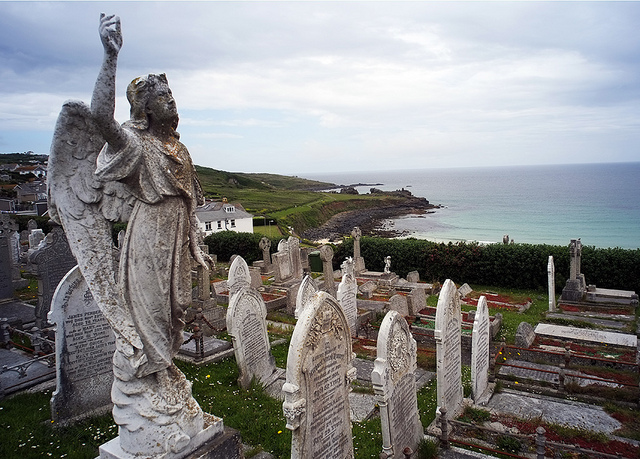By JAYNE MORGAN
I grew up in graveyards. We had one at the bottom of our farm drive and on weekdays I would walk through it to catch the bus to school and then back again on the way home. On Saturdays I would be sent on a mission to rake through the piles of recently discarded wreaths to retrieve the plastic ribbons. Anyone receiving a wrapped gift from our family could, if they looked carefully, have spotted the faint marks from the rusted wires and the creases from previously tied bows.
I was very fond of that small cemetery, but my true graveyard love was further afield. Every Sunday afternoon, my aunt, who was now my mother, would drive us to visit the family, me next to her in the passenger seat with white chrysanthemums wrapped in a damp Daily Telegraph. In this other graveyard, my relatives lay quietly together, a dynasty with a talent mainly for dying. Parents, brothers, sisters, sons and daughters, nearly all of them had left the earth — or rather descended into it — before I arrived. My first mother was buried there, too; she had stayed to meet me only briefly.

Through the lychgate, we would pick our way across the mounds and after I had filled the metal watering can from the pump, I would leave my now-mother to her arranging and trimming and wander off down the gravel paths to read the headstone stories. This one had made it to a hundred and one; that wife had followed her husband after only three weeks; this man and his son both killed in the same year of the war. Lives written out in short lines. Calm inscriptions for those who had lived long enough to need the break “Come unto me all ye who labour”; bitter euphemisms for the premature departures “taken from us” or “so precious the Lord called her early”; and then the agony of the lost children. Parents grasping at the tiny brittle straw of Christian promise, “our little angel is with her heavenly father now”. Not convincing even to my seven-year-old eyes. One child grave had a towering white marble angel, ever-watchful. Some were just small, unmarked humps in the grass. A sign said to please keep to the paths out of respect, but I always thought that being walked over was at least some company.
And then I would go back to find my now-mother standing reading our stories, which were really her stories. She was the daughter who’d said farewell, the sister for whom the whispering in the dark was silenced, and the parent whose brittle straw had been crushed beyond knowing. And I would long for the faces I had never seen, the lives that were never lived, the cards that were never sent, the photographs that were never taken. And after we had stood together a little while, we would go back to the car and go home.
Jayne Morgan is a freelance writer, radio producer, and trainer.
Photo by Allan Rostron, from Flickr Creative Commons




